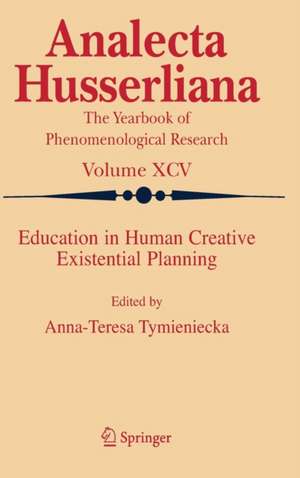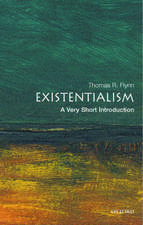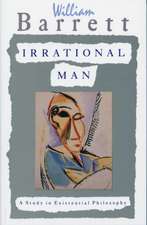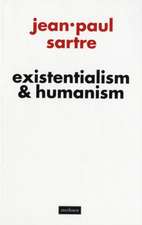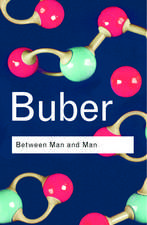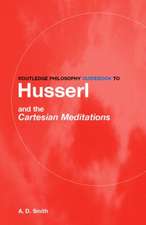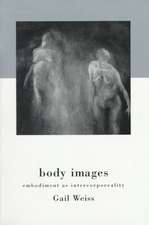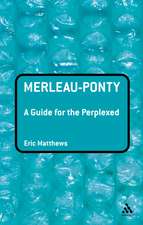Education in Human Creative Existential Planning: Analecta Husserliana, cartea 95
Editat de Anna-Teresa Tymienieckaen Limba Engleză Hardback – 22 noi 2007
The present collection of papers focuses on the underpinnings of the creative workings of the human strategies of reason.
| Toate formatele și edițiile | Preț | Express |
|---|---|---|
| Paperback (1) | 951.47 lei 6-8 săpt. | |
| SPRINGER NETHERLANDS – 17 noi 2010 | 951.47 lei 6-8 săpt. | |
| Hardback (1) | 959.82 lei 6-8 săpt. | |
| SPRINGER NETHERLANDS – 22 noi 2007 | 959.82 lei 6-8 săpt. |
Din seria Analecta Husserliana
- 17%
 Preț: 524.10 lei
Preț: 524.10 lei - 24%
 Preț: 814.98 lei
Preț: 814.98 lei - 20%
 Preț: 570.72 lei
Preț: 570.72 lei - 15%
 Preț: 643.00 lei
Preț: 643.00 lei - 18%
 Preț: 2098.96 lei
Preț: 2098.96 lei - 15%
 Preț: 636.12 lei
Preț: 636.12 lei - 15%
 Preț: 643.84 lei
Preț: 643.84 lei - 18%
 Preț: 952.57 lei
Preț: 952.57 lei - 18%
 Preț: 1222.01 lei
Preț: 1222.01 lei - 18%
 Preț: 950.52 lei
Preț: 950.52 lei - 15%
 Preț: 642.18 lei
Preț: 642.18 lei - 24%
 Preț: 1072.12 lei
Preț: 1072.12 lei - 18%
 Preț: 947.67 lei
Preț: 947.67 lei - 18%
 Preț: 1225.94 lei
Preț: 1225.94 lei - 24%
 Preț: 1075.48 lei
Preț: 1075.48 lei - 18%
 Preț: 949.73 lei
Preț: 949.73 lei - 15%
 Preț: 647.59 lei
Preț: 647.59 lei - 20%
 Preț: 577.73 lei
Preț: 577.73 lei -
 Preț: 386.22 lei
Preț: 386.22 lei - 15%
 Preț: 651.19 lei
Preț: 651.19 lei - 18%
 Preț: 960.42 lei
Preț: 960.42 lei -
 Preț: 390.08 lei
Preț: 390.08 lei - 18%
 Preț: 1128.89 lei
Preț: 1128.89 lei
Preț: 959.82 lei
Preț vechi: 1170.51 lei
-18% Nou
Puncte Express: 1440
Preț estimativ în valută:
183.68€ • 188.11$ • 152.80£
183.68€ • 188.11$ • 152.80£
Carte tipărită la comandă
Livrare economică 18 martie-01 aprilie
Preluare comenzi: 021 569.72.76
Specificații
ISBN-13: 9781402063015
ISBN-10: 1402063016
Pagini: 468
Ilustrații: XI, 452 p.
Dimensiuni: 155 x 235 x 31 mm
Greutate: 0.86 kg
Ediția:2008
Editura: SPRINGER NETHERLANDS
Colecția Springer
Seria Analecta Husserliana
Locul publicării:Dordrecht, Netherlands
ISBN-10: 1402063016
Pagini: 468
Ilustrații: XI, 452 p.
Dimensiuni: 155 x 235 x 31 mm
Greutate: 0.86 kg
Ediția:2008
Editura: SPRINGER NETHERLANDS
Colecția Springer
Seria Analecta Husserliana
Locul publicării:Dordrecht, Netherlands
Public țintă
ResearchCuprins
Thematic Study.- Education For Creative Planning.- Section I.- Human Being as a Creative Differentiator of the Logos of Life.- Education And The Ontopoietic Conception Of Life.- Phenomenological Approach in Education.- Poetry and Knowledge in Plato’S Critique of Sophistic Education.- Civilizational Contexts of the Contemporary Educational Crisis.- Section II.- Beyond Knowledge.- Philosophical System and Art Experience in Hegel and Gadamer.- Distance Education “Here” and “now”.- Art As The Possibility Of Philosophical.- Can Art Be Taught?.- Section III.- Ethical View upon the Human Situation Within the “Unity-of-Everything-There-is-Alive”.- The Educational Aspect of the Primordial Situation of One’s Being-in-the-world.- Action, Work, and Education in Blondel.- Husserl’s Phenomenological Analysis of Ethics As a Foundation for Pedagogy.- The Philosophical Roots of the Concepts of Equality and Justice in Education.- Section IV.- Theories of Nature and Education in the Development of the Human Self in the Eighteenth Century.- Spiritual Experience and the Foundation of Education.- Self-Cultivation and Educative Responsibility.- Merleau-Ponty’s in Northern Feminist Education Context.- Hermeneutic Excellence as a Meta-Ethic.- Section V.- Sensuous Experience and Transcendental Empiricism (F. Brentano, E. Husserl, P. D?le).- Learning by Eureka.- Rethinking Education from the Perspective of Life.- In Search of a New Model of Education.- Section VI.- Art Between Communion and Communication.- Relations with Others in the Face of Lévinas’ il-y-a.- Communication in the Teacher Training University.- Humanities in Transcending the Perspective of Experience.- Phenomenology of Modern Universalism.
Textul de pe ultima copertă
Education is the transmission of knowledge and skill from one generation to another, and is vitally significant for the growth and unfolding of the living individual. It manifests the quintessential ability of the logos to differentiate life in self-individualization from within, and in its spread through inter-generative networks. Without reaching the evolutive phase of the human creative condition, the human being establishes a unique creative platform on which to conduct its co-existence. On this platform the progress of life is being transformed from a natural ontopoietic accomplishment into an autonomous achievement of the creative planning of the human mind. Specifically, human education focuses upon creative planning moving like a pendulum between nature and freedom.
The present collection of papers focuses on the underpinnings of the creative workings of the human strategies of reason.
Papers by:
Anna-Teresa Tymieniecka, Zaiga Ikere, Daniela Verducci, Klymet Selvi, Andrina Tonkli-Komel, Jan Szmyd, Brian Grassom, Alon Segev, Mara Rubene, Dean Komel, Patricia Trutty-Coohill, Carmen Cozma, Piotr Mroz, Clara Mandolini, Mobeen Shahid, Semiha Akinci, Oliver W. Holmes, Khawaja Muhammad Saeed, Angela Ales Bello, Virpi Yliraudanjoki, Brian Hughes, Ella Buceniece, Halil Turan, Fabio Petrelli, Roberto Verolini, Bronislaw Bombala, Osvaldo Rossi, Joanna Handerek, Rimma Kurenkova, M. Chkeneva, Maija Kule, Nikolay Kozhevnikov
The present collection of papers focuses on the underpinnings of the creative workings of the human strategies of reason.
Papers by:
Anna-Teresa Tymieniecka, Zaiga Ikere, Daniela Verducci, Klymet Selvi, Andrina Tonkli-Komel, Jan Szmyd, Brian Grassom, Alon Segev, Mara Rubene, Dean Komel, Patricia Trutty-Coohill, Carmen Cozma, Piotr Mroz, Clara Mandolini, Mobeen Shahid, Semiha Akinci, Oliver W. Holmes, Khawaja Muhammad Saeed, Angela Ales Bello, Virpi Yliraudanjoki, Brian Hughes, Ella Buceniece, Halil Turan, Fabio Petrelli, Roberto Verolini, Bronislaw Bombala, Osvaldo Rossi, Joanna Handerek, Rimma Kurenkova, M. Chkeneva, Maija Kule, Nikolay Kozhevnikov
Caracteristici
Brings to the fore the specific ability of the human achievement to be constantly prepared and adjusted through education The dynamically interactive human platform of existence calls for direction, proportion and balance from education The nature-transcending élan of the human person prompts the cultivation of spiritual aspirations (moral, aesthetic, intellective) Striving to orchestrate the creative planning of the forces of nature, social life, and personal accomplishments, the human being assumes the role of the custodian of life
